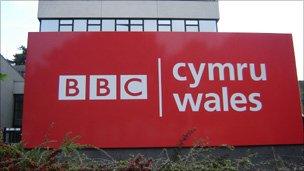BBC annual report hails 'significant' role of Wales
- Published

The BBC annual report says the broadcaster in Wales in playing a significant role in network production
BBC Wales is playing a significant role in network TV production, according to the corporation's annual report.
It won praise for series including Sherlock, Human Planet, Upstairs Downstairs and Doctor Who.
During the year Crimewatch also began broadcasting from Cardiff and a new drama base was launched in Cardiff Bay.
The report says there is need to focus on agreeing a governance framework for S4C from 2013 when the BBC takes responsibility for its funding.
The BBC annual report , external noted that half of all adults in Wales - around 1.2m viewers - watched at least one edition of the news programme Wales Today each week.
Both BBC Radio Cymru and Radio Wales maintained their audiences, with Radio Cymru retaining its position as the most popular station for Welsh speakers.
'Exciting time'
Reacting to the report, Elan Close Stephens, the BBC national trustee for Wales, said it showed BBC Wales was playing "a significant role in producing acclaimed programming for audiences throughout the UK.
"With titles like Sherlock and Upstairs Downstairs joining the already popular Doctor Who, this year was no exception," she said.
"I'm sure that the new production facility at Roath Lock will continue this trend and contribute to this exciting time for the creative industries in Wales," she added.
The report also shows that both English and Welsh language services for the nation maintained their popularity with viewers.
BBC programmes continued to be the most-watched on the Welsh language channel, as a new three-year strategic partnership was agreed between BBC Wales and S4C.
In addition to the renewal of the production arrangement, last year's BBC licence fee settlement ruled that the primary source of funding for S4C will come from the licence fee after 2013.
'Creative independence'
Talks between the BBC Trust and the Government then began to agree the framework for the channel's governance.
Ms Stephens said: "We will be focusing on agreeing with Government a new governance framework for S4C from 2013 which safeguards the channel's creative independence.
"We will also reflect the needs and concerns of Welsh audiences, across both Welsh and English-language programming, as we work with the executive to implement a tough licence fee settlement across the UK."
A review of BBC Wales's performance carried out by the BBC Trust's independent advisory body, Audience Council Wales, was also published on Tuesday.
It noted rapid growth for HD (high definition) viewing, from zero to six per cent of BBC One HD in the last six months.
The council also set out priorities for the Trust to consider for the forthcoming year, including addressing the low availability of BBC Radio Wales on FM, and BBC Radio Cymru and Radio Wales on DAB.
Also a priority was ensuring that nations opt-outs are introduced as quickly as possible on BBC One HD, particularly as the new HD TV production facility in Cardiff Bay will begin operating later this year.
Despite progress made since the trust's review of UK-wide reporting of devolved issues, the council said it felt there was more work to be done in improving standards in this area.
The council noted the reduction in hours of English language programming produced by BBC Wales specifically for Wales, and warned that a possible drop in funding could have implications for the quality of this type of programming.
- Published29 June 2011
- Published22 June 2011
- Published22 June 2011
- Published29 June 2011